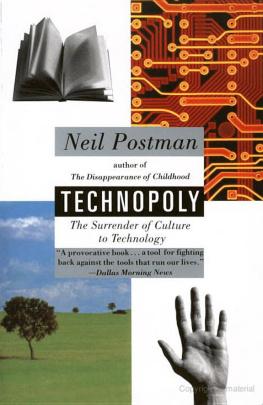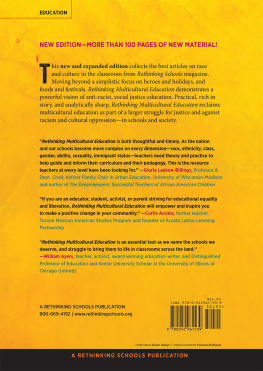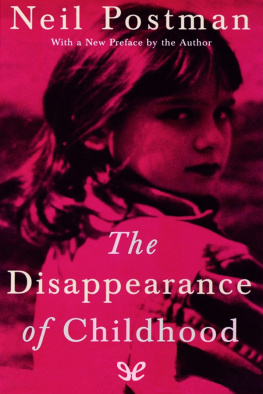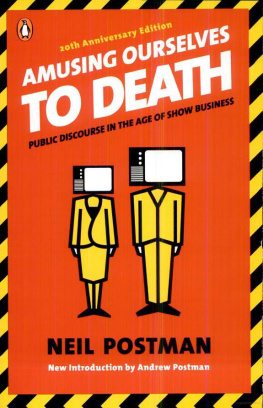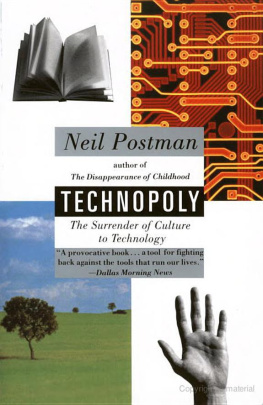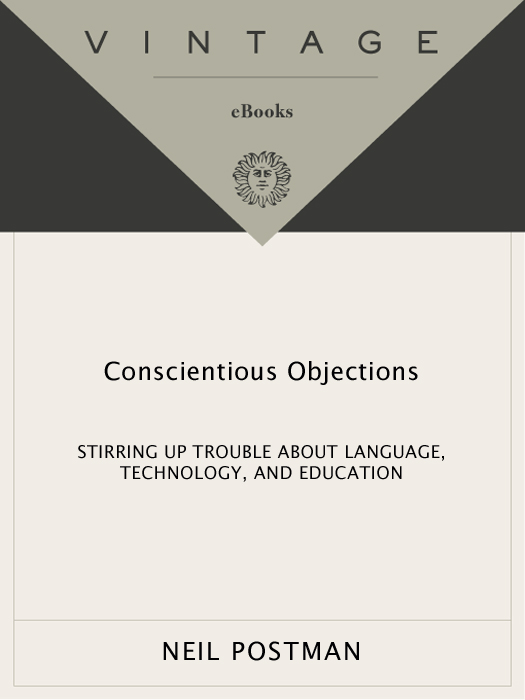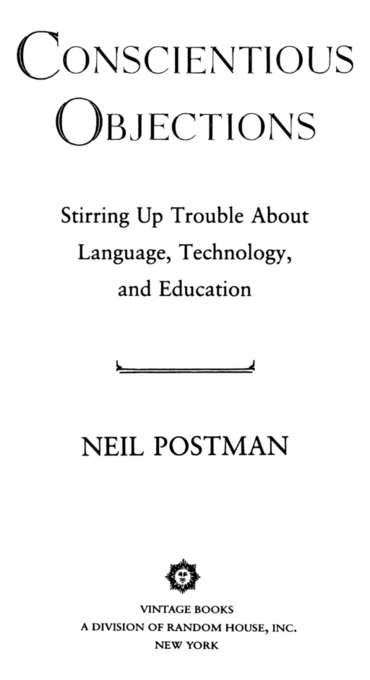FIRST VINTAGE BOOKS EDITION, FEBRUARY 1992
Copyright 1988 by Neil Postman
All rights reserved under International and Pan-American Copyright Conventions. Published in the United States by Vintage Books, a division of Random House, Inc., New York, and simultaneously in Canada by Random House of Canada Limited, Toronto. Originally published in hardcover by
Alfred A. Knopf, Inc., New York, in 1988.
Megatons for Anthromegs was originally published in The Village Voice. Reprinted by permission of The Village Voice. Grateful acknowledgment is made to Saturday Review for permission to reprint Etiquette by Neil Postman on (The Phoenix Nest) of Saturday Review, June 8, 1963.
Copyright 1963 by Saturday Review.
Reprinted by permission.
Additional acknowledgments of previous publication of selections contained in the present work, and of permission to reprint such previously published material, will be found in the Acknowledgments on .
Library of Congress Cataloging-in-Publication Data
Postman, Neil.
Conscientious objections : stirring up trouble about language,
technology, and education / Neil Postman.1st Vintage Books ed.
p. cm.
Originally published: 1st ed. New York: Knopf, 1988.
eISBN: 978-0-307-79731-5
1. Language and education. 2. TechnologySocial aspects.
3. Mass mediaUnited States. I. Title.
[P40.8.P667 1992]
303.40973dc20 91-58082
v3.1
ALSO BY NEIL POSTMAN
Technopoly
Amusing Ourselves to Death
The Disappearance of Childhood
Teaching as a Conserving Activity
Crazy Talk, Stupid Talk
Teaching as a Subversive Activity
(with Charles Weingartner)
To my parents
CONTENTS
ACKNOWLEDGMENTS
Some of the essays in this book appeared in various journals, although in significantly different forms. Social Science as Moral Theology made its debut as a speech and then appeared in Et Cetera. The Naming of Missiles began its journey to these pages as a much shorter piece in The Realist. My German Question, as noted in the preface to the piece, appeared in Stern in German; it has not been published in English before. A Muted Celebration was commissioned by the New York University alumni magazine but makes its first published appearance here. The Parable of the Ring Around the Collar appeared in a lengthier version in Panorama. Etiquette appeared in the Saturday Review and is reprinted by permission. Megatons for Anthromegs appeared in a somewhat different form in The Village Voice and is also reprinted by permission. Safe-Fail, an experiment which Liberation took a chance on, appears here as a more well-developed story.
The essay entitled The News is the product of a collaboration with Professor Jay Rosen of New York University, and any of its inadequacies are his, not mine: which is to say, he has given me permission to include that last remark. He is one of several colleagues and students on whom I have inflicted my ideas and whose generosity of spirit has encouraged me to put them forward in this book.
PREFACE
The two best places for a writer to live are America and Russia. Both are dynamic imperial powers prone to making mistakes. I should not like to live in Switzerland. Switzerland does not make mistakes, and therefore deprives a writer of grievances. For a writer, that society is best which is most burdensome. The favor is returned: for a society, that writer is best who is most burdensome.
It is true enough that in Russia writers with serious grievances are arrested, while in America they are merely featured on television talk shows where all that is arrested is their development. This is an important difference, but it does nothing to change the fact that grievance is the source of all interesting prose. Without grievance, a writer tends to become a celebrant, which is an agreeable but repetitious state. After you have sung two choruses of God Bless America, what else is there to say?
I must hasten to add that though grievance is a necessary condition for good prose, it is far from sufficient. There are, after all, differences between a writer and a wimp. The differences are easier to notice than to describe, but we may at least say this: a good writer is a wimp who has found a unique and prudent form in which to say No. I use the word unique to mean that the form is well suited to the nature of the writer, assuming the writer is sane. I use the word prudent to mean that the form is well suited to the nature of the grievance, assuming the grievance is sane. According to these definitions, there is no better complaint ever written than the Declaration of Independence or a worse one than Mein Kampf. Among writers whose exposition, by my lights, has achieved triumphs of nay-saying are George Orwell, who found his form in a humorless, crystalline understatement; H. L. Mencken, who found his in a brassy, mean-spirited, but imaginative sarcasm; and Russell Baker, who finds his in detached whimsy. My impression is that today Orwell is read very little, and then only in school, Mencken not at all. This is a sorrowful condition, with ominous overtones for the well-being of the Republic. Fortunately, Baker is available and inexhaustible. I imagine him to be like some fourth-century citizen of Rome who is amused and intrigued by the Empires collapse but who still cares enough to mock the stupidities that are hastening its end. He is, in my opinion, a precious national resource, and as long as he does not get his own television show, America will remain stronger than Russia.
It is possible that the essays included here will earn no judgment higher than wimpery recollected in tranquillity. Readers, as always, will decide. But they are entitled to know at the start what I intend. There is a theme to these essays, or, to be exact, three themes that make a single whole; that is to say, I think of them as inseparable. Together, they have formed the core of my academic interests for thirty years.
First, some of the essays are about the triumphs of one-eyed technology and, in particular, how these triumphs have laid waste some of our most creative, not to mention charming, habits of thought. I call technology one-eyed because, like Cyclops, it sees only what is directly in front of it. I am not, let it be said, some latter-day Luddite. I raise no complaint against a machine doing what it was designed to do. After all, who expects a machine to notice its own side effects? To care about the social and psychic consequences of its own presence? Machines ask no questions, have no peripheral vision or depth perception. They see the future through the fixed eye of their technical possibilities. But it is well said that in the country of the blind, the one-eyed man is king. In America, and increasingly in Europe, technology is a one-eyed king ruling unopposed amidst idiot cheering. I object to this state of affairs, and I would like some of my essays to lend support to lively discussions of where we are being taken, and in whose interests, by the unfettered development of technology. It is clear enough that our engineers, not our poets, are the unacknowledged legislators of our time, and perhaps that is as it should be. But unless there is a vigorous opposition party, technological tyranny is inevitable. Man cannot live by electric wiring alone, and this obvious fact must be part of any plans we make for the future.


